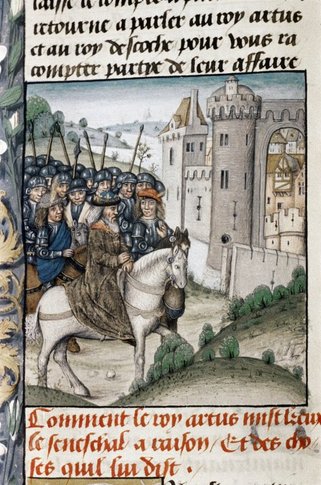
First, I want to emphasize the role of God in the philosophical underpinnings of both the absolute monarchy and the subsequent evolution to Magna Carta--a first step to limiting the absolute power of the King. The power of the absolute monarch came from what was termed "divine right". God was thought to have ordained the King as the ruler. God's will was manifest in the power of the king to raise armies, defeat enemies and protect the kingdom. The outcomes of battles were a reflection of God's will. In order to be legitimate in the eyes of the church, challenges to the authority of a King had to advance the claim of another legitimate heir--someone else who could claim divine lineage.
Thus, when a group of barons--landholders with populations of people from whom they could conscript a military force--stood against King John in 1215, and essentially forced the King to agree to limits on his power, it was a major shift. John immediately reneged on his commitment to Magna Carta, sparking a civil war. John died during the war, and the end result was that his nine-year old son, Henry, became King. Henry was ultimately accepted by the barons when his regent agreed to rule in accordance with Magna Carta. All of these things, from John's death to the acceptance of his son as King in a power-sharing agreement with the barons, were seen as evidence of God's will [1].
Second, I want to point out that Magna Carta was all about the rights of nobles, clergy and freeholders versus the rights of the King. It had nothing to do with the rights of everyday people, although over time it came to be associated with principles of individual liberty. One could imagine the barons, attempting to motivate their people to fight against King John, might have suggested that there was something in it for everyone. However, the lowest class addressed were freeholders, those who paid landlords to work their land but were not bound to the land. Thus, the charter only provided rights for the top 26 percent of the people in the kingdom [2]: there are certainly no guarantees of rights for commoners in the document sealed by King John. The people empowered by Magna Carta were people of means, people with property and freedom. But the legend that somehow individual rights for all people were generated in this process was an influence on the thinking of subsequent generations, including the colonists who framed our Declaration of Independence 560 years later. And the colonists would take the next step, asserting that ALL men are endowed by their Creator with certain inalienable rights that included life, liberty and the pursuit of happiness.
[1] Danziger, Danny, and Gillingham, John (2004) 1215: The Year of Magna Carta
[2] Daniel D. McGarry, Medieval history and civilization (1976) p 242

 RSS Feed
RSS Feed
